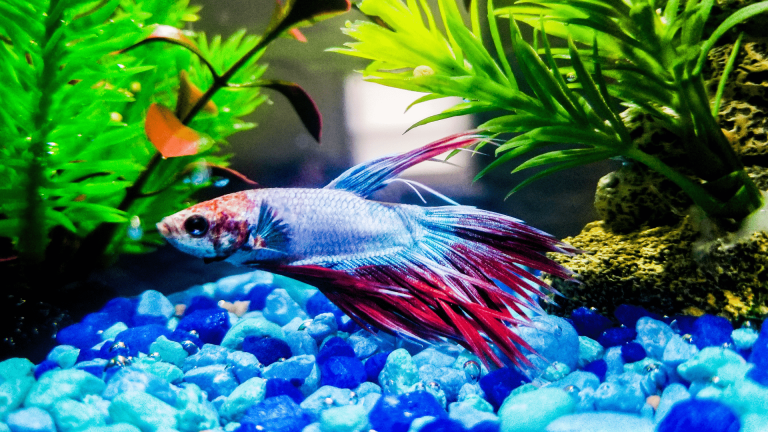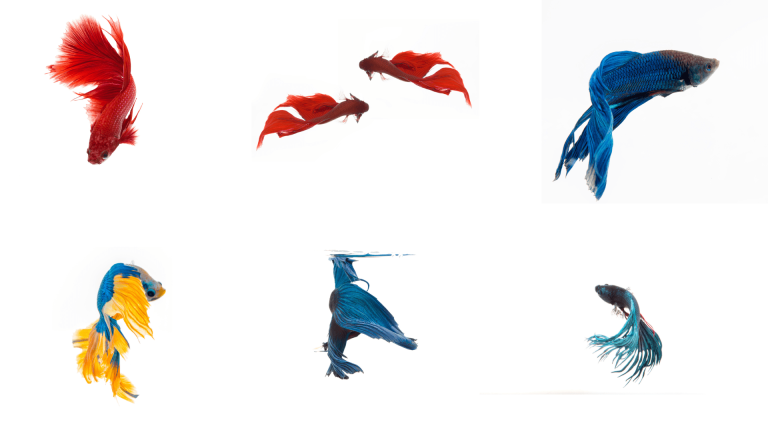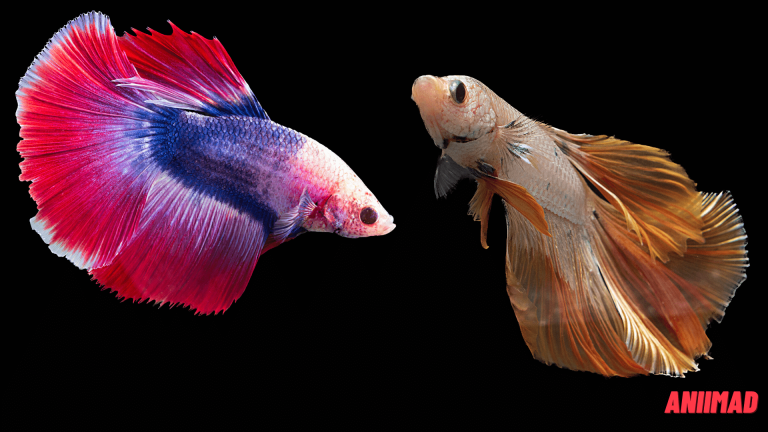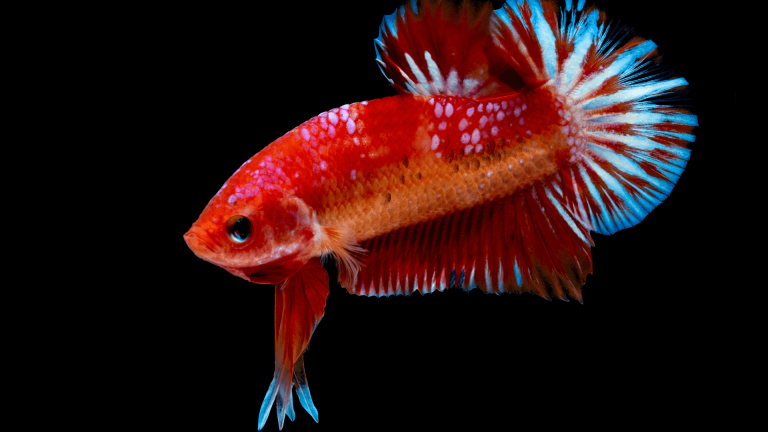Can Betta Fish Live With Other Fish? 24 Tips For Success
Can Betta Fish Live With Other Fish? The aggressive and possessive characteristics of Siamese fighting fish, sometimes known as betta fish, are well known. In general, male bettas should not be housed with other fish, especially other male bettas, as they are prone to fighting and can cause severe harm or even death to each other.
Introducing betta fish to a community tank can be a rewarding experience with careful consideration and proper planning. While bettas are generally territorial and aggressive towards other males, they can coexist with certain fish species under the right conditions.
Here Are 24 Tips for Successfully Keeping Betta With Other Fish in a Community Tank

01. Choose Peaceful Tankmates
Select fish species known for their peaceful temperament and compatibility with bettas. Avoid fin nippers, aggressive fish, or species with similar colors that may trigger territorial behavior.
02. Tank Size
Provide a spacious tank with ample swimming space and hiding spots. The minimum recommended tank size for a betta fish and tankmates is 10 gallons, but larger tanks are preferred to reduce aggression and stress.
03. Tank Setup
Arrange the tank with plants, caves, and other decorations to create territories and visual barriers. This helps reduce aggression and provides hiding places for fish to retreat.
04. Slow Introduction
Introduce the betta fish to the tank as the last addition after the other fish have settled. Rearrange decorations to remove existing territories before adding the betta. This can help minimize aggression.
05. Monitor Behavior

Observe the interactions between the betta and other fish closely. If aggression or fin-nipping occurs, be prepared to separate the fish or rearrange the tank setup to alleviate stress.
06. Provide Multiple Hiding Spots
Ensure plenty of hiding places, such as caves or dense vegetation, for fish to seek refuge and establish their territories.
07. Compatible Tankmates
Consider peaceful schooling fish like neon tetras, harlequin rasboras, ember tetras, or temperate bottom-dwelling species like corydoras or otocinclus catfish. These species generally coexist well with bettas.
08. Avoid Brightly Colored or Long-Finned Fish
Betta fish may mistake fish with long, flowing fins or bright colors as rivals, leading to aggression. Opt for fish with shorter fins or subdued colors.
09. Provide Adequate Feeding
Ensure all tankmates receive sufficient food during feeding times to prevent competition for food. Use sinking pellets for bottom-dwelling fish to ensure they receive their share.
10. Avoid Overcrowding

Avoid overcrowding the tank, which can lead to stress and aggression. Maintain appropriate stocking levels based on the tank size and the fish species’ needs.
11. Separate Aggressive Fish
Any tankmate displaying consistent aggression towards the betta or other fish must be removed and housed in an independent tank.
12. Regular Water Changes
Maintain excellent water quality through frequent water changes and proper filtration. Clean water helps reduce stress and prevents diseases.
13. Be Prepared to Separate
If the betta fish shows persistent aggression or tankmates become stressed or injured, separate them and provide alternative housing.
13. Consider Tankmates of Similar Size
Opt for tankmates that are similar in size to the betta fish. This helps prevent the betta from perceiving smaller fish as potential prey or larger fish as threats.
14. Maintain Water Parameters
Keep the water parameters consistent and suitable for all the fish in the tank. Perform regular water tests to monitor ammonia, nitrite, nitrate, pH, and temperature levels. Different fish species may have specific requirements, so find a balance that suits all inhabitants.
15. Quarantine New Fish
Before introducing new fish to the community tank, quarantine them in a separate tank for a few weeks to ensure they are healthy and disease-free. This prevents the spread of potential illnesses to the existing tankmates, including the betta.

16. Remove Aggressive Tankmates Promptly
If a tankmate shows consistent aggression towards the betta or other fish, it’s important to separate it from the tank as soon as possible. Aggressive behavior can lead to stress, injuries, and even death.
17. Pay Attention to Fin Damage
Keep an eye on the condition of the betta’s fins. If you notice signs of fin nipping or damage, it may indicate aggression from tank mates. Take appropriate action, such as rearranging the tank or removing the aggressive fish.
18. Provide Visual Barriers
Use tall plants, decorations, or a well-placed aquarium background to create visual barriers within the tank. This helps reduce stress and aggression by limiting direct line-of-sight between fish.
19. Consider Bottom-Dwelling Tankmates
Adding bottom-dwelling fish like shrimp or snails can be a good option. They occupy a different tank area and are less likely to provoke the betta’s territorial instincts.
20. Research Individual Fish Species
Before introducing any fish to the tank, thoroughly research their behavior, compatibility, and specific care requirements. This ensures that they are suitable companions for the betta fish.
21. Be Patient

It may take time for the betta and other fish to adjust to each other’s presence. Allow them to establish territories and hierarchies within the tank. Patience is key to a successful community tank setup.
22. Have a Backup Plan
It’s important to have a backup plan in case the betta fish cannot coexist peacefully with other tankmates. This may involve having a separate tank ready to house the betta if necessary.
23. Seek Professional Advice
If you need clarification on which fish are compatible with bettas or need further guidance, consult knowledgeable aquarium professionals or experienced hobbyists. They can share insightful information based on their knowledge and individual experiences.
What Fish Cannot Be With a Betta Fish?

Certain fish species are generally not recommended to keep with betta fish due to their potential to provoke aggression or stress in the betta. These fish include:
01. Other male bettas
Male bettas are highly territorial and likely to fight each other, often resulting in severe injury or death.
02. Fin-nipping fish
Species like tiger barbs, serape tetras, and some danios tend to nip at the betta’s flowing fins, which can cause stress and damage to the betta.
03. Aggressive or semi-aggressive fish
Fish known for their aggressive behavior, such as cichlids (e.g., African cichlids, oscars) and larger barbs (e.g., tinfoil barbs, red hook silver dollar), can be too aggressive for bettas and may harm or kill them.
04. Fast and flashy fish
Some fast-moving fish with bright colors can stress out bettas, as their vibrant appearance may trigger the betta’s territorial instincts. Examples include guppies, male endless, and some male platies.
05. Long-finned or slow-moving fish
Fish with long, flowing fins or slow swimming speeds can be mistaken for rival bettas and may trigger aggression. Examples include fancy male guppies, fancy male endless, and angelfish.
Do Betta Fish Fight With Other Fish?

Betta fish, particularly male bettas, are known for their aggressive behavior and territorial nature. Male bettas should not be housed with other fish, including male bettas, as they are prone to fighting. They have undergone years of selective breeding for their fighting impulses, which can lead to severe harm or even death.
Male bettas have long, flowing fins that other fish may mistake for rival males. It can trigger aggression not only from the betta but also from other fish. On the other hand, female bettas tend to be less aggressive and sometimes keep together in groups called sororities, provided there is enough space and plenty of hiding spots.
It is important to note that there can be individual variations in behavior among bettas. Some bettas may be more peaceful and tolerant, while others may be aggressive. Therefore, it is crucial to closely monitor their behavior and prepare to separate them if any signs of aggression or stress occur.
When considering tankmates for a betta fish, it’s generally safer to choose compatible fish species that are peaceful, have minimal finnage, and are not known to provoke aggression. Proper research and understanding of the specific needs and behaviors of the potential tankmates are essential to creating a harmonious and safe aquarium environment.
Can I Put Guppies With a Betta?

Introducing guppies as tankmates for a betta fish can be risky, as there is a potential for aggression and fin-nipping. Guppies have vibrant colors and long, flowing fins, which can trigger the betta’s territorial instincts. While some people have successfully housed bettas and guppies together, it largely depends on the individual temperaments of the fish involved.
Here are a few considerations if you decide to keep guppies with a betta
01. Tank size
Provide a spacious tank with plenty of hiding spots, plants, and visual barriers. It will allow the fish to establish their territories and provide places for the guppies to seek refuge if needed.
02. Group size
Guppies are social fish and prefer living in groups. Keeping a small school of guppies (three or more) can help disperse the aggression and minimize the focus on the betta.
03. Monitoring behavior
Observe the fish closely for signs of aggression or stress. If the betta starts chasing or nipping at the guppies’ fins, it may be necessary to separate them to prevent injury.
04. Individual personalities
Each betta has its unique character, and some may be more tolerant of tankmates than others. Similarly, guppies can vary in terms of their behavior and finnage length. It’s essential to prepare to make adjustments based on the specific dynamics of your fish.

Frequently Asked Questions (FAQs) About Can Betta Fish Live With Other Fish
Can betta fish live with other fish?
Betta fish can coexist with certain tankmates under specific conditions.
What fish can house with betta fish?
Some suitable tankmates for bettas include female bettas, non-aggressive small fish like tetras and rasboras, peaceful catfish species, and compatible snails or shrimp.
Can male bettas live with other fish?
Male bettas are typically aggressive and territorial, making it challenging to house them with other fish, including male bettas.
Can female bettas live together?
Female bettas can keep together in groups called sororities, but it’s essential to provide a spacious tank with hiding spots to minimize aggression.
What fish should not keep with betta fish?
It’s generally not recommended to keep bettas with other male bettas, fin-nipping fish, aggressive or semi-aggressive fish, fast and flashy fish, or long-finned/slow-moving fish.

What factors should we consider when introducing tankmates to betta fish?
Tank size, individual fish personalities, proper hiding spots, and close behavior monitoring are essential when introducing tankmates to betta fish.
Can guppies be housed with betta fish?
Introducing guppies as tankmates for bettas can be risky due to potential aggression and fin-nipping. It depends on the individual temperaments of the fish involved.
What precautions should you take when keeping bettas with other fish?
It’s crucial to closely monitor the behavior of all fish, be prepared to separate them if aggression occurs, and have a backup plan or separate tank available if needed.
Although bettas can coexist with other fish, it is essential to consider each fish’s unique demands and behaviors and provide an environment conducive to their well-being.
Conclusion
Betta fish can live with other fish under specific circumstances and careful monitoring. While some compatible tankmates, such as female bettas and certain peaceful species, can be successfully housed with bettas, it’s essential to acknowledge that bettas are known for their aggression and territorial nature.
Factors such as tank size, individual fish personalities, and providing adequate hiding spots and visual barriers are crucial when introducing other fish. Close observation of their behavior is necessary, and if any signs of aggression or stress arise, separating the fish may be required to ensure their safety.
It’s important to understand that bettas are generally better suited to live alone in their aquariums, where they can thrive without the potential stress of cohabitation. If you decide to house bettas with other fish, always have a backup plan and be prepared to make adjustments based on the specific dynamics of your fish.






